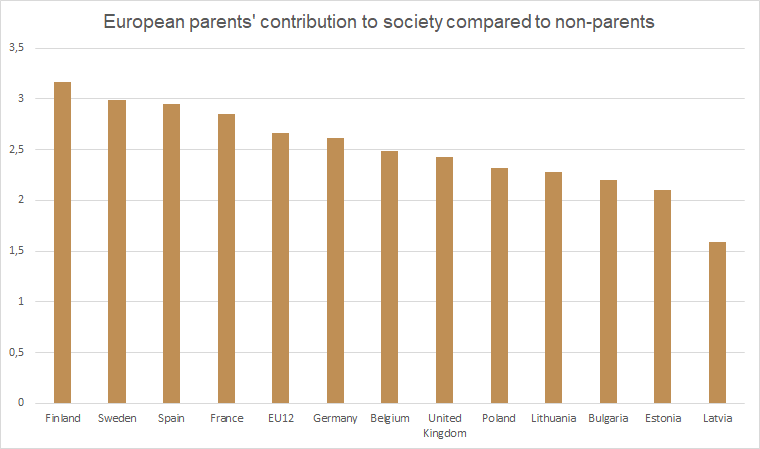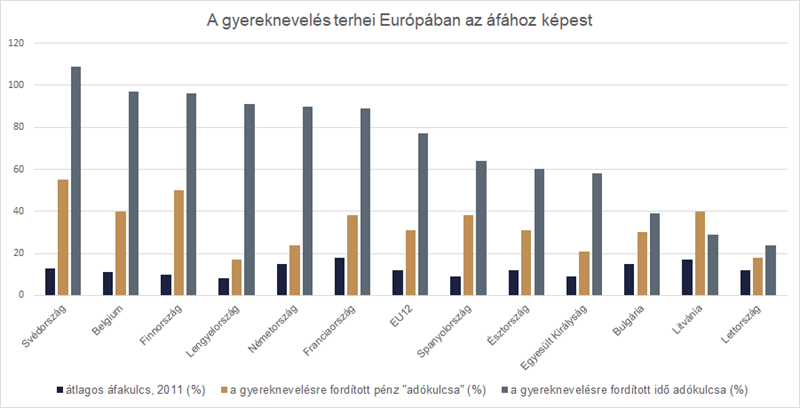Calculations: how much worse off a parent is compared to a non-parent

Incentive packages offered by family-friendly policies in Europe are by no means enough to compensate parents for the full costs of raising children. Considering taxes and public benefits only, parents are 37% better off than non-parents. However, the balance flips if the entire package is taken into account: the average contribution of parents to the maintenance of society is more than two and a half times higher than that of non-parents, if we include less visible intra-household cash flows (for example, when parents buy goods and services for their children) and time spent on unpaid household work. This is the main conclusion of a study in which a researcher of the University of Southern Denmark and two researchers of the Corvinus University of Budapest analysed 12 European countries based on 2010 data aggregated by Eurostat, the statistical office of the EU.
Although Europe is ageing, it is actually penalising child-rearing in financial terms
The research reveals the following: In Europe, working-age parents devote resources corresponding to their average earnings of 17.5 years on average to society (including their children) over their lifetime, while non-parents transfer resources equivalent to 6.6 years of earnings on average to the state and others during their working years. The average parent spends 4.7 years of average income on taxes and contributions net of benefits received, compared to 6.6 years in the case of a non-parent, while the value of net intra-family flows (including cash and time) is much higher in the case of parents compared to non-parents: Income of 12.8 years, as opposed to income of 0.2 years in the case of non-parents.
‘Our research shows that resources spent on child-rearing within the family are not really reflected in the statistics. This indicates that welfare states, although they are ageing, continue to put the burden of producing their own future tax revenues – the next generation of taxpayers – mainly on families,’ said Róbert Iván Gál, Corvinus researcher and one of the co-authors of the study.
Mothers contribute to the upbringing of their children mainly by spending their own time on unpaid work (household work, looking after children), and fathers help mainly by using their money to buy goods and services. On average, the burden of unpaid work is 1.6 times higher than the burden of money transfers within the family (average earnings of 7.9 years vs. 4.9 years). Overall, the contribution by parents is about 2.66 times higher than by non-parents, if money and time input within the family are also taken into account. If only intra-family and public flows of funds are considered, the ratio drops to 1.49, and if only public transfers are considered, the ratio is 0.73, so it seems to be reversed in favour of non-parents.
‘Even family-friendly policy models do not mitigate the punitive impact of the burden of raising children, which is likely to be largely borne by parents themselves through higher taxes and social security contributions. It is in Sweden and Finland where the gap between parents and non-parents is the largest, with a factor of three, while the lowest difference of 1.6 is calculated for Latvia,” notes Róbert Iván Gál.
Time spent on children has a metaphorical tax rate that is six times higher than VAT
The analysis shows that if an average European parent suddenly hypothetically became a non-parent, they could consume 31% more goods and services. The average tax rate of 31% indirectly imposed on child-raising (excluding time input) is more than two and a half times higher than the average European VAT rate of 12%. And if we look only at the cost of time spent on unpaid work, the implicit tax rate is 77% on average, which is more than six times higher than the average European VAT rate.

‘We have highlighted an important phenomenon by showing that almost all non-parental transfers are visible in statistics, compared to just over a quarter of parental transfers. Again, what fathers contribute is largely measured, socially valued, and protected by contracts and ownership rights; what mothers contribute, especially in the home, to raising the next generation, is hardly measured. This upsets power relations within the household,” said Márton Medgyesi, Corvinus researcher and co-author of the study.
‘The social benefits of parenthood are shared with non-parents everywhere, which actually reduces the benefits available to parents. Higher contributions and lower rewards: this seems to be a double blow for those raising children. The full, and rather high cost of reproducing society is unevenly distributed in today’s Europe, and much of it remains undetected by statistics. However, visibility matters a lot. As societies usually value what they measure, imperfectly measured things tend to be imperfectly understood and undervalued,’ the analysis concludes.
The study was published last October in the Royal Society Open Science journal, the authors are Pieter Vanhuysse of the University of Southern Denmark, and Márton Medgyesi and Iván Róbert Gál of the Corvinus University of Budapest. The research used data from Belgium, Bulgaria, Estonia, Finland, France, Germany, Latvia, Lithuania, Poland, Spain, Sweden and the UK.